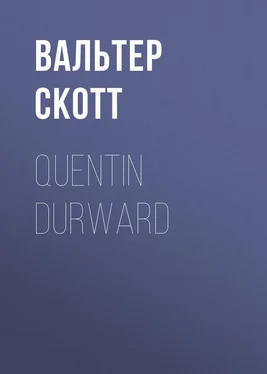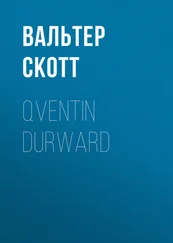Вальтер Скотт - Quentin Durward
Здесь есть возможность читать онлайн «Вальтер Скотт - Quentin Durward» — ознакомительный отрывок электронной книги совершенно бесплатно, а после прочтения отрывка купить полную версию. В некоторых случаях можно слушать аудио, скачать через торрент в формате fb2 и присутствует краткое содержание. Жанр: foreign_antique, foreign_prose, Альтернативная история, на английском языке. Описание произведения, (предисловие) а так же отзывы посетителей доступны на портале библиотеки ЛибКат.
- Название:Quentin Durward
- Автор:
- Жанр:
- Год:неизвестен
- ISBN:нет данных
- Рейтинг книги:3 / 5. Голосов: 1
-
Избранное:Добавить в избранное
- Отзывы:
-
Ваша оценка:
- 60
- 1
- 2
- 3
- 4
- 5
Quentin Durward: краткое содержание, описание и аннотация
Предлагаем к чтению аннотацию, описание, краткое содержание или предисловие (зависит от того, что написал сам автор книги «Quentin Durward»). Если вы не нашли необходимую информацию о книге — напишите в комментариях, мы постараемся отыскать её.
Quentin Durward — читать онлайн ознакомительный отрывок
Ниже представлен текст книги, разбитый по страницам. Система сохранения места последней прочитанной страницы, позволяет с удобством читать онлайн бесплатно книгу «Quentin Durward», без необходимости каждый раз заново искать на чём Вы остановились. Поставьте закладку, и сможете в любой момент перейти на страницу, на которой закончили чтение.
Интервал:
Закладка:
“That is a beautiful creature,” said the old man at last, raising his head, and looking steadily and firmly at Quentin, when he put the question, – “a lovely girl to be the servant of an auberge [an inn]? She might grace the board of an honest burgess; but ‘tis a vile education, a base origin.”
It sometimes happens that a chance shot will demolish a noble castle in the air, and the architect on such occasions entertains little goodwill towards him who fires it, although the damage on the offender’s part may be wholly unintentional. Quentin was disconcerted, and was disposed to be angry – he himself knew not why – with this old man, for acquainting him that this beautiful creature was neither more nor less than what her occupation announced; the servant of the auberge – an upper servant, indeed, and probably a niece of the landlord, or such like; but still a domestic, and obliged to comply with the humour of the customers, and particularly of Maitre Pierre, who probably had sufficiency of whims, and was rich enough to ensure their being attended to.
The thought, the lingering thought, again returned on him, that he ought to make the old gentleman understand the difference betwixt their conditions, and call on him to mark, that, how rich soever he might be, his wealth put him on no level with a Durward of Glen Houlakin. Yet, whenever he looked on Maitre Pierre’s countenance with such a purpose, there was, notwithstanding the downcast look, pinched features, and mean and miserly dress, something which prevented the young man from asserting the superiority over the merchant which he conceived himself to possess. On the contrary, the oftener and more fixedly Quentin looked at him, the stronger became his curiosity to know who or what this man actually was; and he set him down internally for at least a Syndic or high magistrate of Tours, or one who was, in some way or other, in the full habit of exacting and receiving deference. Meantime, the merchant seemed again sunk into a reverie, from which he raised himself only to make the sign of the cross devoutly, and to eat some of the dried fruit, with a morsel of biscuit. He then signed to Quentin to give him the cup, adding, however, by way of question, as he presented it, “You are noble, you say?”
“I surely am,” replied the Scot, “if fifteen descents can make me so – so I told you before. But do not constrain yourself on that account, Maitre Pierre – I have always been taught it is the duty of the young to assist the more aged.”
“An excellent maxim,” said the merchant, availing himself of the youth’s assistance in handing the cup, and filling it from a ewer which seemed of the same materials with the goblet, without any of those scruples in point of propriety which, perhaps, Quentin had expected to excite.
“The devil take the ease and familiarity of this old mechanical burgher!” said Durward once more to himself. “He uses the attendance of a noble Scottish gentleman with as little ceremony as I would that of a gillie from Glen Isla.”
The merchant, in the meanwhile, having finished his cup of water, said to his companion, “From the zeal with which you seem to relish the Vin de Beaulne, I fancy you would not care much to pledge me in this elemental liquor. But I have an elixir about me which can convert even the rock water into the richest wines of France.”
As he spoke, he took a large purse from his bosom, made of the fur of the sea otter, and streamed a shower of small silver pieces into the goblet, until the cup, which was but a small one, was more than half full.
“You have reason to be more thankful, young man,” said Maitre Pierre, “both to your patron Saint Quentin and to Saint Julian, than you seemed to be but now. I would advise you to bestow alms in their name. Remain in this hostelry until you see your kinsman, Le Balafre, who will be relieved from guard in the afternoon. I will cause him to be acquainted that he may find you here, for I have business in the Castle.”
Quentin Durward would have said something to have excused himself from accepting the profuse liberality of his new friend; but Maitre Pierre, bending his dark brows, and erecting his stooping figure into an attitude of more dignity than he had yet seen him assume, said in a tone of authority, “No reply, young man, but do what you are commanded.”
With these words he left the apartment, making a sign, as he departed, that Quentin must not follow him.
The young Scotsman stood astounded, and knew not what to think of the matter. His first most natural, though perhaps not most dignified impulse, drove him to peer into the silver goblet, which assuredly was more than half full of silver pieces to the number of several scores, of which perhaps Quentin had never called twenty his own at one time during the course of his whole life. But could he reconcile it to his dignity as a gentleman, to accept the money of this wealthy plebeian? – This was a trying question; for, though he had secured a good breakfast, it was no great reserve upon which to travel either back to Dijon, in case he chose to hazard the wrath and enter the service of the Duke of Burgundy, or to Saint Quentin, if he fixed on that of the Constable Saint Paul; for to one of those powers, if not to the king of France, he was determined to offer his services. He perhaps took the wisest resolution in the circumstances, in resolving to be guided by the advice of his uncle; and, in the meantime, he put the money into his velvet hawking pouch, and called for the landlord of the house, in order to restore the silver cup – resolving, at the same time, to ask him some questions about this liberal and authoritative merchant.
The man of the house appeared presently; and, if not more communicative, was at least more loquacious, than he had been formerly. He positively declined to take back the silver cup. It was none of his, he said, but Maitre Pierre’s, who had bestowed it on his guest. He had, indeed, four silver hanaps of his own, which had been left him by his grandmother, of happy memory, but no more like the beautiful carving of that in his guest’s hand, than a peach was like a turnip – that was one of the famous cups of Tours, wrought by Martin Dominique, an artist who might brag all Paris.
“And, pray, who is this Maitre Pierre,” said Durward, interrupting him, “who confers such valuable gifts on strangers?”
“Who is Maitre Pierre?” said the host, dropping the words as slowly from his mouth as if he had been distilling them.
“Ay,” said Durward, hastily and peremptorily, “who is this Maitre Pierre, and why does he throw about his bounties in this fashion? And who is the butcherly looking fellow whom he sent forward to order breakfast?”
“Why, fair sir, as to who Maitre Pierre is, you should have asked the question of himself; and for the gentleman who ordered breakfast to be made ready, may God keep us from his closer acquaintance!”
“There is something mysterious in all this,” said the young Scot. “This Maitre Pierre tells me he is a merchant.”
“And if he told you so,” said the innkeeper, “surely he is a merchant.”
“What commodities does he deal in?”
“Oh, many a fair matter of traffic,” said the host; “and especially he has set up silk manufactories here which match those rich bales that the Venetians bring from India and Cathay. You might see the rows of mulberry trees as you came hither, all planted by Maitre Pierre’s command, to feed the silk worms.”
“And that young person who brought in the confections, who is she, my good friend?” said the guest.
“My lodger, sir, with her guardian, some sort of aunt or kinswoman, as I think,” replied the innkeeper.
“And do you usually employ your guests in waiting on each other?” said Durward; “for I observed that Maitre Pierre would take nothing from your hand, or that of your attendant.”
Читать дальшеИнтервал:
Закладка:
Похожие книги на «Quentin Durward»
Представляем Вашему вниманию похожие книги на «Quentin Durward» списком для выбора. Мы отобрали схожую по названию и смыслу литературу в надежде предоставить читателям больше вариантов отыскать новые, интересные, ещё непрочитанные произведения.
Обсуждение, отзывы о книге «Quentin Durward» и просто собственные мнения читателей. Оставьте ваши комментарии, напишите, что Вы думаете о произведении, его смысле или главных героях. Укажите что конкретно понравилось, а что нет, и почему Вы так считаете.












